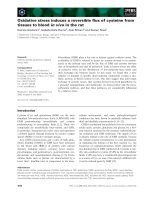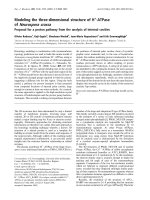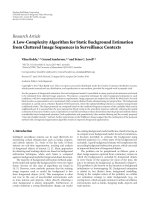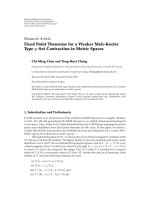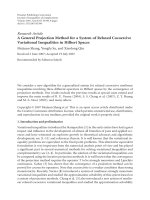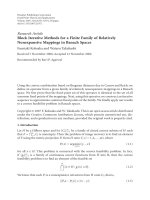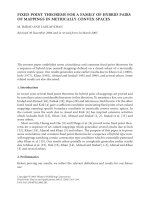topic guarantee for a fair trial from paragraph61 to 65 in general comment no 24 2019
Bạn đang xem bản rút gọn của tài liệu. Xem và tải ngay bản đầy đủ của tài liệu tại đây (2.45 MB, 23 trang )
<span class="text_page_counter">Trang 1</span><div class="page_container" data-page="1">
<b>MINISTRY OF EDUCATION AND TRAINING HO CHI MINHCITY OF UNIVERSITY OF LAW HIGH QUALITY TRAINING</b>
<b>Subject: JUVENILE CRIMINAL JUSTICE </b>
<b>TOPIC: GUARANTEE FOR A FAIR TRIAL FROM PARAGRAPH61 TO 65 IN GENERAL COMMENT NO.24 (2019)</b>
<b>Lecturers: Dr. Le Huynh Tan Duy </b>
<b>Faculty of Criminal Law, Ho Chi Minh City University of Law</b>
<i><b> Ho Chi Minh City, 29th September 2023</b></i>
</div><span class="text_page_counter">Trang 2</span><div class="page_container" data-page="2"><b>TABLE OF CONTENTS</b>
<b>TABLE OF CONTENTS...</b>
<b>TABLE OF ABBREVIATION...</b>
<b>I. ANALYSIS OF PARA 61- 65 OF GENERAL COMMENT NO.24...</b>
1.1 Presence and examination of witness (art.40(2)(b)(iv))...
1.2 Right of review or appeal (art.40 (2) (b) (v))...
1.3 Free assistance of an interpreter (art.40 (2) (b) (vi))...
1.4 Conclusion...
<b>II. COMPARE VIETNAMESE LAWS WITH UN STANDARD AND NORMS...</b>
2.1 The provision of the Vietnamese Juvenile criminal justice...
2.1.1 Presence and Examination of Witnesses in Juvenile Trials (related to Para 61)...
2.1.2 Right to Appeal for Juvenile Offenders (related to Para 62-63)...
2.1.3 Free Assistance of an Interpreter (related to Para 64-65)...
2.2 Contribution to the development of Vietnamese Law related to guarantee for fair trial...
</div><span class="text_page_counter">Trang 3</span><div class="page_container" data-page="3"><b>TABLE OF ABBREVIATION</b>
ICCPR International Covenant on Civil and Political Rights
UNCRC United Nations Convention on the Rights of the Child
</div><span class="text_page_counter">Trang 4</span><div class="page_container" data-page="4">Article 40 regulates the treatment of children in respect of allegations, accusations or infringements of penal law. The treatment accorded is to be consistent with the promotion of the child's sense of dignity or worth, reinforce the child's respect for the human rights of others, take into account the child's age, and the desirability of promoting the child's reintegration and the child's assuming a constructive role in society.
In this context, we delve into three essential components that underpin a fair trial: the examination of witnesses, the right of review or appeal, and the provision of free assistance of an interpreter. These elements collectively serve as critical safeguards, ensuring that justice is not only administered but is done so with due regard to the principles of fairness, equality, and accessibility.
The global community has recognized the paramount importance of safeguarding the rights and privacy of juveniles within the context of criminal justice. International regulations, such as the Convention on the Rights of the Child (CRC) and General Comment No. 24 (GC24) have provided a legal framework to guide nations in this regard. Through the incorporation of some of these restrictions into local legislation, Vietnam has also made significant strides. However, the journey towards ensuring the full protection of rights related to the examination of witnesses, the right of review or appeal, and the provision of free assistance of an interpreter in the context of our legal system is far from complete. There remain gaps and ambiguities in our national legal system when it comes to these critical aspects. It is imperative that we, as a nation, reaffirm and clarify our commitment to upholding these rights within our legal processes.
<b>Too long to read onyour phone? Save</b>
to read later on your computer
Save to a Studylist
</div><span class="text_page_counter">Trang 5</span><div class="page_container" data-page="5"><b>I.ANALYSIS OF PARA 61- 65 OF GENERAL COMMENT NO.24 </b>
1.1 Presence and examination of witness (art.40(2)(b)(iv))
General Comment No.24 (GC24) paragraphs 61 contain the rules governing these rights. It provides:
<b><small>Para 61 GC24. Children have the right to examine witnesses who testify against them and to involve</small></b>
<small>witnesses to support their defense, and child justice processes should favor the child’s participation,under conditions of equality, with legal assistance.</small>
Children also have the right to question witnesses, and if they are found guilty of a crime, they can have their conviction and sentence reviewed by a higher court. <small>1</small> Like adults, they should have the right to examine witnesses who testify against them and should be able to involve witnesses in support of their defense.
Furthermore, the emphasis on "conditions of equality" underscores the fundamental need for fairness and impartiality within the justice system. It means that children should be treated with the same level of respect and consideration as adults, regardless of their age. Encouraging child participation in legal processes is another critical aspect of the statement. Allowing children to actively engage in proceedings not only empowers them but also helps them better understand the complexities of the legal system. Child-friendly procedures can make this participation more accessible and less intimidating, ensuring that their voices are heard and their rights are protected.
Although the CRC is a major progressive step towards a child-centered criminal justice system, the ICCPR does provide additional safeguards for children. This procedural guarantee is originally provided in Art 14(3)(e) of ICCPR, Art 7.1 of Beijing Rules and Art 40(2)(b)(iv) of the CRC. The latter article prescribes:
<small>“Every child alleged as or accused of having infringed the penal law has at least the followingguarantees ... to examine or have examined adverse witnesses and to obtain the participation andexamination of witnesses on his or her behalf under conditions of equality”.</small>
According to the Committee on the Rights of the Child and the Human Rights Committee, this procedural safeguard derives from the principle of equality of arms (between defense and prosecution). The ultimate aim of this principle is to ensure the accused has the same rights as are available to the prosecution of compelling the presence of witnesses and examining or cross-examining any witnesses. The<small>2</small> Committee on the Rights of the Child explains there are distinctions between different legal systems, especially between the accusatorial and inquisitorial trials, involving the use of the term “to examine or to have examined”. In the inquisitorial system,<small>3</small> 1<small> Van Bueren, G. (2006). </small><i><small>Article 40: Child criminal justice. </small></i><small>Leiden: Martinus Nijhoff Publishers.</small>
2<small> Human Rights Committee, </small><i><small>General Comment No.32, </small></i><small>UN Doc CCPR/C/GC/32. para 39</small>
</div><span class="text_page_counter">Trang 6</span><div class="page_container" data-page="6">defendants often transfer their right to examine witnesses to the lawyer or, in the case of children, to another appropriate body . Nonetheless, the Committee on the Rights of<small>4</small> the Child emphasizes that the child should be informed of the possibility to examine witnesses and given opportunities to express his or her views on this matter in accordance with his or her age and maturity.<small>5</small>
Generally, there are two aspects to this procedural guarantee. First, juvenile offenders have the right to examine witnesses against them (adverse witnesses). Second, under the same conditions, juvenile offenders are also entitled to present and examine witnesses on their behalf. As to the first aspect, the Human Rights Committee notes that a proper opportunity to question and challenge adverse witnesses is only given at some stages of the criminal process. The second aspect is<small>6</small> not an unlimited right.
This means juvenile offenders can only present witnesses who are relevant for their defense. In other words, art 14(3)(e) of the ICCPR does not entitle the defendant<small>7</small> to submit evidence at any time or in any manner.<small>8</small>
On the other hand, the Human Rights Committee asserts that, within these parameters and subject to the restrictions on the use of statements, confessions, and other evidence obtained in violation of Article 7 of the ICCPR, the right not to be subject to torture or to cruel, inhuman, or degrading treatment or punishment, it is essentially up to the legislatures of State parties to determine the admissibility of evidence and how their courts evaluate it. These CRC and ICCPR rules provide the legal framework for both offenders and prosecutors to assess the validity and proven impact of evidence as well as the veracity of witness testimony.<small>9</small>
1.2 Right of review or appeal (art.40 (2) (b) (v))
This right is regulated in Para 62-63 of General Comment No.24 (GC24). It provides:
<b><small>Para 62 of GC24. The child has the right to have any finding of guilt or the measures imposed</small></b>
<small>reviewed by a higher competent, independent and impartial authority or judicial body. This right ofreview is not limited to the most serious offenses. States parties should consider introducing automaticmeasures of review, particularly in cases that result in criminal records or deprivation of liberty.Furthermore, access to justice requires a broader interpretation, allowing eviews or appeals on any</small>r
<small>procedural or substantive misdirection, and ensuring that effective remedies are available.</small>
4<small> Ibid </small>
5<small> Committee on the Rights of the Child, </small><i><small>General Comment No. 10, </small></i><small>UN Doc CRC/C/GC/10, para 59 </small>
6<small> Human Rights Committee, </small><i><small>General Comment No.32, </small></i><small>UN Doc CCPR/C/GC/32, para 39.</small>
7<small> Ibid</small>
8<i><small>Johnson v Spain,</small></i><small> Communication No.1102/2002, UN Doc CCPR/C/86/D/1102/2002 (2006), para 6.5. </small>
9<i><small> Le, Huynh Tan Duy (2013). Protecting the rights of juvenile offenders in Vietnamese and Victorian criminalprocedure laws in compliance with the United Nations benchmark model of juvenile justice. La Trobe. Thesis.</small></i>
</div><span class="text_page_counter">Trang 7</span><div class="page_container" data-page="7"><b><small>Para.63 of GC24. The committee recommended that States parties withdraw any reservation made in</small></b>
<small>respect of Article 40 (2) (b) (v).</small>
Importantly, the statement emphasizes that the right of review should not be restricted solely to the most serious offenses. This is a significant recognition that even for less severe infractions, children deserve a mechanism to challenge decisions that could have long-lasting consequences on their lives, such as criminal records or deprivation of liberty.
It acknowledges that certain consequences of legal proceedings can have a lasting impact on a child's future prospects and rehabilitation. The allowing reviews or appeals on any procedural or substantive misdirection is a crucial element of a fair and effective legal system. It ensures that children have access to remedies not only for obvious legal errors but also for any injustices, whether procedural or substantive, that may have occurred during their legal proceedings. It ensures that their rights are protected through reviews conducted by competent, independent, and impartial authorities, regardless of the severity of the offense.
Similarly, in Article 14(5) of the ICCPR:
<small>“Every child alleged as or accused of having infringed the penal law has at least the followingguarantees: If considered to have infringed the penal law, to have this decision and any measuresimposed in consequence thereof reviewed by a higher competent, independent and impartial authorityor judicial body according to law”.</small>
It is also arguable that similar child-centric procedures should be applied to review or appeal proceedings when a child is in court for those purposes. This includes providing specialized training for lawyers and judges involved in the appeal process to ensure they are well-versed in child rights and needs. These rights are<small>10</small> enshrined in binding international agreements. Children also have the right to question witnesses, and if they are found guilty of a crime, they can have their conviction and sentence reviewed by a higher court. Access to review by a higher court must be<small>11</small> “according to law” (as expressed in Article 14(5) of the ICCPR). The Human Rights Committee has explained that this expression does not mean that the very existence of the right to appeal is left to the discretion of States Parties, since the right is guaranteed by the ICCPR . Rather, the expression refers to the modalities by which<small>12</small> the review is to be carried out. <small>13</small>
10<small> United Nations Convention on the Rights of the Child (1989), art 12.</small>
11<small>Van Bueren, G. (2006). </small><i><small>Article 40: Child criminal justice.</small></i><small> Leiden: Martinus Nijhoff Publishers, page 21.</small>
12<i><small> Mennen v the Netherlands, HRC Communication 1797/2008, UN Doc CCPR/ C/99/D/1797/2008 (2010), </small></i>
<small>para 8.2.</small>
13<small> UN Human Rights Committee, </small><i><small>CCPR General Comment 32 (2007),</small></i><small> para 45. See also </small><i><small>Salgar de Montejo vColombia, HRC Communication 64/1979, UN Doc CCPR/C/15/D/64/1979 (1982), para 10.4; Gomaríz Valera v</small></i>
</div><span class="text_page_counter">Trang 8</span><div class="page_container" data-page="8">1.3 Free assistance of an interpreter (art.40 (2) (b) (vi))
This procedural right is guaranteed by Para. 64-65 of General Comment No.24 as follow:
<b><small>Para 64 of GC No.24. A child who cannot understand or speak the language used in the child justice</small></b>
<small>system has the right to the free assistance of an interpreter at all stages of the process. Such interpretersshould be trained to work with children.</small>
<b><small>Para 65 of GC No.24. States parties should provide adequate and effective assistance by well-trained</small></b>
<small>professionals to children who experience communication barriers. </small>
Ensuring that children who are unable to understand or speak the language used in the child justice system have access to competent interpreters is paramount for upholding their rights and ensuring a fair trial process. This right to free assistance of an interpreter of all stages of the legal proceeding acknowledges that language should not be a barrier to a child’s understanding of their situation and their ability to participate in their own defense.
Additionally, it emphasizes how crucial it is for these interpreters to receive specialized training to work with kids, taking into account their particular needs and vulnerabilities. States parties are required to do more than just provide translators; they must also provide thorough and efficient assistance from qualified experts who can help kids overcome communication difficulties and guarantee that everyone may access justice, regardless of language limitations. In doing so, the legal system affirms its dedication to equity and equality in the administration of justice in addition to upholding children's rights.
Like adults, children who cannot understand or speak the language used in legal proceedings are entitled to the assistance of an interpreter. In certain cases, particularly in Kwa Zulu Natal in South Africa, child victims of sexual abuse are not directly questioned by legal counsel. Instead, questions are directed to an interpreter,<small>14</small> and only if the interpreter can understand the question will it be posed to the child.
Both Article 40(2)(b)(vi) of the CRC and Article 14(3)(f) of the ICCPR provide this procedural right. The CRC stipulates that a child offender who is unable to understand or speak the language being used is entitled to the free aid of an interpreter. Obviously, this right should be accessible throughout the entire criminal process to ensure justice and "equality of arms" in criminal trials.<small>15</small>
<i><small>Spain, </small></i><small>HRC Communication 1211/2003, UN Doc CCPR/C/87/D/1211/2003 (2006), para 7; </small><i><small>Sánchez and Claresv Spain, </small></i><small>HRC Communication 1332/2004, UN Doc CCPR/C/88/D/1332/2004 (2006), para 7.2; and </small><i><small>Serena vSpain, HRC Communications 1351/2005 and 1352/2005, UN Doc CCPR/ C/92/D/1351–1352/2005 (2008), para</small></i>
<small>9.3. </small>
14<small> Ibid</small>
15<small> Chu Thanh Quang, </small><i><small>“Handling juvenile offenders under criminal law in Vietnam”</small></i><small>, UNAFEI: Annual report </small>
</div><span class="text_page_counter">Trang 9</span><div class="page_container" data-page="9">It is suggested that the interpreter should have knowledge and experience of working with children in order to assist the juvenile offender to fully comprehend any question raised and protect the right to a fair trial and ensure effective participation.<small>16</small> Moreover, deriving from the spirit of this article and in compliance with Article 23 of the CRC, the Committee on the Rights of the Child proposes that children with speech impairment or other disabilities involved in criminal proceedings should be provided with adequate and effective assistance by well-trained professionals, e.g. in sign language, by State parties. This approach aligns with the commitment to uphold the<small>17</small> rights and dignity of all children within the justice system, regardless of their unique needs and circumstances.
1.4 Conclusion
These procedural rights ensure fairness, accountability, and access to justice for all individuals involved in legal proceedings. In General Comment No. 24, the regulation of the presence and examination of witnesses, the right of review or appeal, and the provision of free interpreters in juvenile justice is specified in Article 61-65, and these provisions are closely interpreted in conjunction with the principles outlined in Article 40(2)(b)(iv), Article 40(2)(b)(v), and Article 40(2)(b)(vi), as well as some specific rules.
<small>Justice Programs. Available at: (Accessed: 25 September 2023). </small>
16<small> Phuong Mai, D.T., “Juv</small><i><small>enile justice principles under criminal procedure and penal laws”</small></i><small>, Vietnam Lawand Legal Forum Magazine, Available at: (Accessed: 25 September 2023)</small>
17<i><small> Le Huynh Tan Duy., “Evaluation of Vietnamese criminal procedure law applicable to juvenile offenders (case study of the United Nations model of juvenile criminal justice”, Available at: </small></i>
</div><span class="text_page_counter">Trang 10</span><div class="page_container" data-page="10"><b>II.COMPARE VIETNAMESE LAWS WITH UN STANDARD ANDNORMS </b>
2.1 The provision of the Vietnamese Juvenile criminal justice
Vietnam ratified the United Nations Convention on the Rights of the Child (UNCRC) on February 20, 1990, making the first nation in Asia and the second nation in the world do so. Children's rights are always acknowledged in the Vietnamese constitutions, from the Constitution of 1946 to the present Constitution of 2013. There are currently explicit legal protections intended to ensure fair proceedings for juvenile offenders in the Penal Code and Criminal Procedure Code.
These sections cover minors’ rights and responsibilities as well as those of organizations and people who have been granted the ability to initiate legal action against young offenders.
<b>2.1.1 Presence and Examination of Witnesses in Juvenile Trials (related toPara 61) </b>
<i>a) Overview</i>
In the Vietnamese criminal procedure law, juvenile offenders are divided into two subjects, called ‘accused persons’ and ‘defendants . These procedural<small>18</small> participants appear in the investigation, prosecution and first-instance trial stages. Since the Vietnamese criminal justice system is modeled after the inquisitorial system, similar to Article 40(2)(b)(iv), juvenile offenders exercise this right by participating in the “confrontation" of witnesses, and/or exam witness by themselves or acting via their defense counsels or representatives in first-instance trials . Overall, there are no<small>19</small> differences between juvenile and adult offenders in exercising the right to examine witnesses.
<i>b) Confrontation</i>
In investigation and prosecution stages, offenders may participate in criminal investigation activity called “confrontation”. Article 189 of the CRC stated that confrontation is conducted when there are contradictions in the statements of two or more persons, including offenders and witnesses, after having applied other investigative measures but the conflict has not yet been resolved.
Although the purpose of the regulation is to find the objective truth, it is a way for offenders to utilize their right to examine witnesses, especially those who contradict them .<small>20</small>
18<small> Malaysian Child Act, Section 11, 117.</small>
19<small> Malaysian Case Law, Case</small><i><small> Buri Hemna v. PP</small></i><small>, 1998) 5 MLJ 813.</small>
</div><span class="text_page_counter">Trang 11</span><div class="page_container" data-page="11"><i>c) First-instance trial</i>
Similar to previous stages, defendants can exercise this right by directly examining witnesses at hearings. In addition, offenders can exercise their right to cross-examine witnesses with the assistance of defense lawyers or advocates.
Specifically, Article 61(1)(i) and Article 72(i) recognize the right to request the Judge to examine the witness or do it by themselves or make requests of a counsel. More clearly, Article 311(2) provides that after the inquiries of the trial panel and prosecutor, defendants may further examine witnesses with the consent of the Judge or exercise this right via their defense counsel.
Furthermore, specific provisions related to this entitlement apply to juvenile offenders, as outlined in Article 420(3).
<b>2.1.2 Right to Appeal for Juvenile Offenders (related to Para 62-63) </b>
<i>a) Overview </i>
Vietnamese criminal procedure law contains provisions governing the right of appeal for those involved in the criminal justice system generally and juvenile defendants specifically that are quite similar to those found in international law and the justifications provided by the Human Rights Committee and the Committee on the Rights of the Child.
<i>b) Safeguarding Defendant Rights and Appeals in Vietnamese CriminalProcedure Code 2015</i>
<i>First, Article 27 of Criminal Procedure 2015</i> established a mechanism for reviewing effective judgment or ruling in case of serious errors. These are also compatible with the principle of implementation of two level-trial regimes prescribed in a supplementation of the <i>Criminal Procedure Code 2003</i>.
Additionally, the characteristics and obligations of the appeal trial are comparable to those stated in <i>General Comment No. 32 </i>of the Human Rights Committee and are outlined in Vietnamese criminal procedural law and examined in officially cited sources. By assessing "the sufficiency of the evidence and of the law, the conviction and sentence," the appellate trial procedure is intended to generally analyze the essence of the case in this context.<small>21</small>
21<small> “Equality of arms requires the enjoyment of ‘the same procedural rights by all the parties unless distinctionsare based on law and can be justified on objective and reasonable grounds, not entailing actual disadvantages orother unfairness to the defendant”, Human Rights Committee, </small><i><small>General Comment No. 32, </small></i><small>UN Doc</small>
</div>

